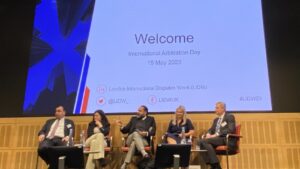The landscape for Russia-related disputes in London has changed significantly in the last year. The panel of Egishe Dzhazoyan (King & Spalding), Katia Finkel (Baker & McKenzie), Valery Knyazev (Kroll) and Tatiana Minaeva (RPC) moderated by Baiju Vasani (Twenty Essex) discussed shifting trends, challenges arising from international sanctions, enforcement issues, and potential opportunities for dispute resolution during the first day of LIDW 2023.
Shifting Trends in Russia-related Disputes

Tatiana Minaeva highlighted the findings from LCIA Casework Reports of recent years (2019 and 2021) which showed a decline in the percentage of arbitration cases originating from the CIS region (the Commonwealth of Independent States includes nine full member states including Russia, Kyrgyzstan, Azerbaijan, and Belarus). In 2019, the CIS region accounted for 9% of LCIA cases, with this number down to 2.4% by 2022. Ms Minaeva noted that there was also a decrease in the involvement of companies from Cyprus and the BVI, with 18% in 2019 to less than 10% in 2022. She added that another recent shift has been in Russian parties moving their disputes to Asian seats such as Hong Kong and Singapore; the predominant reason for this shift being international sanctions. The UK sanctions regime is engaged where the dispute involves individuals, law firms, institutions based in the UK, where the seat of arbitration is in the UK, or a transfer of funds related to the dispute has a link to the UK.
Challenges for Experts and Licensing Issues
Valery Knyazev addressed the challenges resulting from the uncertainty of expert services qualifying as licensed activities under the sanctions regimes in various jurisdictions. The position in the UK for accounting services being provided to Russian parties was clear, in that the UK government banned any such activities in 2022. However, he added that there was confusion about whether expert services were considered to be part of such accounting services and whether expert services required a license under the sanctions regime. He referred to the case of PJSC National Bank Trust & Anr. v. Mints & Ors, which considered activities that designated persons can undertake subject to licenses being granted under the UK sanctions regime.
Further, Mr Knyazev emphasized that the situation becomes more difficult when one of the parties is originally incorporated in another jurisdiction (such as the US), the other is a Russian party, and the dispute is based in London. This scenario involves additional challenges as the sanctions rules for American parties would also have to be considered in deciding whether expert services can ultimately be provided. He added that in such scenarios, parties often resorted to appointing experts from other jurisdictions, eg the European Union, where accounting services were excluded from the purview of EU sanctions.
Types of Disputes to be Expected in the Future
Katia Finkel outlined three categories of disputes that she expects to see in the future involving Russian parties: insurance claims, contract claims, and treaty claims. Insurance claims, she said, primarily arise in the aviation industry and involve Russian aviation companies. Political risk insurance was also an important consideration in these cases. Contract claims could involve both the Russian Federation and private Russian parties. Energy and investment-related disputes were also significant, particularly concerning companies that wanted to exit Russia and dispose of their investments in Russia. In such scenarios, risk allocation and causation were critical issues. Treaty claims would include cases under the Energy Charter Treaty (ECT) and over 60 bilateral investment treaties (BITs) that Russia is a party to. Key considerations in such treaty claims would be the arbitrability of these disputes in the context of sanctions, access to justice as a fundamental right, and the relationship between the subject matter and the sanctions regime.
Enforcement Challenges and Potential Opportunities
Egishe Dzhazoyan emphasized the challenges of enforcing awards in the context of sanctions. He noted that this was somewhat of an unusual situation where the award debtor’s willingness to pay might be hampered by sanctions. One of the solutions in such a scenario, he noted, was the use of escrow accounts for holding the proceeds from an award. On the issue of enforcement, he also added that state immunity further complicates the matter, as Russia’s frozen foreign assets amount to a staggering $300 billion. He also noted another mechanism for enforcement which was the transfer of forfeited Russian funds for the benefit of Ukraine. Mr Dzhazoyan noted that the US had recently authorized such transfer in one case. Some countries, such as Canada, have specific laws addressing this issue, while others, like Switzerland were still considering this issue.
Opportunities and Challenges Ahead
Mr Dzhazoyan continued by stating that there were three potential avenues for disputes involving Russia. One of them was state-to-state disputes which is available under several BITs. Another was the potential to establish a tribunal akin to the US-Iran Claims Tribunal, although, he noted that such a step would require significant diplomatic support. Lastly, the Russian Federation may pursue claims against other countries through national courts.
***
The panel concluded with remarks on the future of Russian disputes based in London stating that these disputes presented a complex landscape influenced by shifting trends, international sanctions, enforcement challenges, and potential opportunities. The evolving nature of these disputes highlighted the need for further clarity, licensing provisions, and international cooperation to navigate the complexities effectively.
________________________
To make sure you do not miss out on regular updates from the Kluwer Arbitration Blog, please subscribe here. To submit a proposal for a blog post, please consult our Editorial Guidelines.


